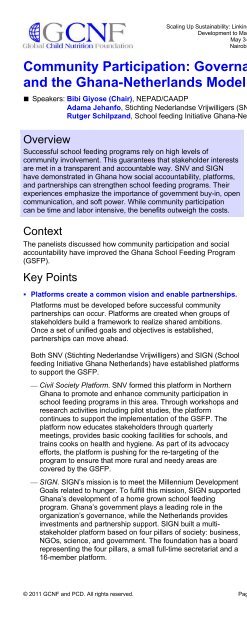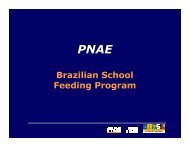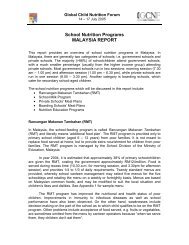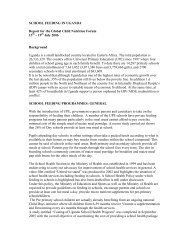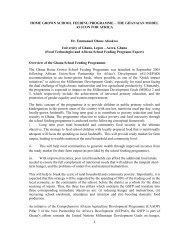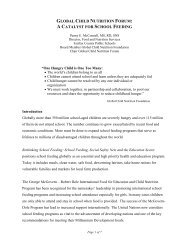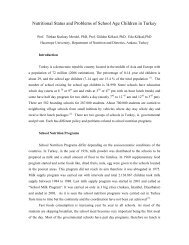EXECUTIVE SUMMARY - Global Child Nutrition Foundation
EXECUTIVE SUMMARY - Global Child Nutrition Foundation
EXECUTIVE SUMMARY - Global Child Nutrition Foundation
Create successful ePaper yourself
Turn your PDF publications into a flip-book with our unique Google optimized e-Paper software.
Scaling Up Sustainability: Linking School Feeding with Agriculture<br />
Development to Maximize Food Security<br />
May 3-7, 2011<br />
Nairobi, Kenya<br />
Community Participation: Governance and Social Accountability<br />
and the Ghana-Netherlands Model<br />
■ Speakers: Bibi Giyose (Chair), NEPAD/CAADP<br />
Adama Jehanfo, Stichting Nederlandse Vrijwilligers (SNV), Ghana<br />
Rutger Schilpzand, School feeding Initiative Ghana-Netherlands (SIGN)<br />
Overview<br />
Successful school feeding programs rely on high levels of<br />
community involvement. This guarantees that stakeholder interests<br />
are met in a transparent and accountable way. SNV and SIGN<br />
have demonstrated in Ghana how social accountability, platforms,<br />
and partnerships can strengthen school feeding programs. Their<br />
experiences emphasize the importance of government buy-in, open<br />
communication, and soft power. While community participation<br />
can be time and labor intensive, the benefits outweigh the costs.<br />
Context<br />
The panelists discussed how community participation and social<br />
accountability have improved the Ghana School Feeding Program<br />
(GSFP).<br />
Key Points<br />
Platforms create a common vision and enable partnerships.<br />
Platforms must be developed before successful community<br />
partnerships can occur. Platforms are created when groups of<br />
stakeholders build a framework to realize shared ambitions.<br />
Once a set of unified goals and objectives is established,<br />
partnerships can move ahead.<br />
Both SNV (Stichting Nederlandse Vrijwilligers) and SIGN (School<br />
feeding Initiative Ghana Netherlands) have established platforms<br />
to support the GSFP.<br />
Civil Society Platform. SNV formed this platform in Northern<br />
Ghana to promote and enhance community participation in<br />
school feeding programs in this area. Through workshops and<br />
research activities including pilot studies, the platform<br />
continues to support the implementation of the GSFP. The<br />
platform now educates stakeholders through quarterly<br />
meetings, provides basic cooking facilities for schools, and<br />
trains cooks on health and hygiene. As part of its advocacy<br />
efforts, the platform is pushing for the re-targeting of the<br />
program to ensure that more rural and needy areas are<br />
covered by the GSFP.<br />
SIGN. SIGN’s mission is to meet the Millennium Development<br />
Goals related to hunger. To fulfill this mission, SIGN supported<br />
Ghana’s development of a home grown school feeding<br />
program. Ghana’s government plays a leading role in the<br />
organization’s governance, while the Netherlands provides<br />
investments and partnership support. SIGN built a multistakeholder<br />
platform based on four pillars of society: business,<br />
NGOs, science, and government. The foundation has a board<br />
representing the four pillars, a small full-time secretariat and a<br />
16-member platform.<br />
© 2011 GCNF and PCD. All rights reserved. Page 21<br />
Without local ownership and social accountability, school<br />
feeding programs will not succeed.<br />
When the Ghana School Feeding Program (GSFP) began to<br />
expand, little attention was paid to stakeholder concerns.<br />
Inadequate information sharing and weak community<br />
involvement led to negative public outcry. Transparency and<br />
program accountability had to be improved.<br />
To remedy these problems, SNV launched the GSFP Social<br />
Accountability Program. Social accountability is a process that<br />
enables stakeholders to charter development programs and<br />
contribute to their realization. Many of the program activities<br />
utilize the “social audit cycle”. This is an approach in which local<br />
stakeholders gather and analyze data, present the findings<br />
publicly, and then assess results and set new targets.<br />
Source: Community Participation: Governance and Social Accountability –<br />
A Case from Ghana and SNV, Adama Jehanfo, SNV<br />
For example, the Independent Civil Society Monitoring and<br />
Evaluation initiative hopes to incorporate social accountability<br />
throughout the GSFP. This one-year program is comprised of<br />
three phases:<br />
Phase 1: Baseline. The focus of this phase is data collection.<br />
SNV has selected and trained 14 civil society organizations to<br />
gather basic data from the community about the GSFP.<br />
Information has been collected about the program objectives,<br />
funding, successes, and challenges. This phase is now<br />
complete.<br />
Phase 2: Consolidation. The second phase is focused on<br />
aggregating the data and analyzing it.<br />
Phase 3: Final. In the last phase of the project, the civil society<br />
organizations submit a report with their findings to the<br />
government. This report includes advice about how the school<br />
feeding program should be improved. At this time, the data<br />
analysis and report writing are nearly complete.


